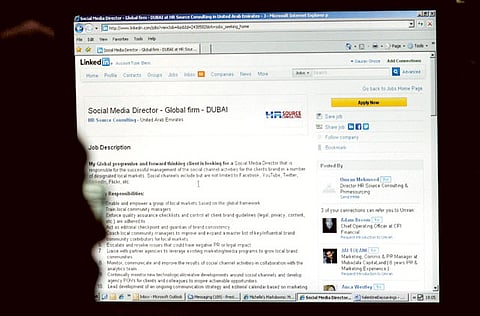Digital media: avoid sending mixed messages
Businesses must identify their social media audiences for advertising or PR pitches

Dubai: If you count yourself as an avid Facebook user, you would have noticed the corporate-sponsored ads streaming into the news feed alongside the regular postings from your friends. Twitter, coming off a monumental $2 billion (Dh7.34 billion) IPO, wants advertisers to start taking it as seriously as its legions of subscribers do.
LinkedIn, which now has a 10 million subscriber base in the Middle East and North Africa territory, has just debuted the ‘Showcase Pages’ for brands to “segment content” for targeted audiences.
All of which is fine, but how sure can businesses be that their messages are getting across?
“If you don’t adhere to best practice and a well-thought through strategy you risk damaging your brand reputation irrevocably,” said Kiera Doherty, head of digital communications at Weber Shandwick MENA.
“Any brand putting revenue generation ahead of user experience is playing a losing game; sure there might be the opportunity to create short term revenue from quick initiatives but these will only benefit advertisers and not consumers.
“Advertising is not intended to be irrelevant, irritating or just plain awful. In fact advertising should be highly targeted, with the right message communicated in the right way at the right time. For example, someone searching for a hotel in Athens is unlikely to be unhappy being presented with an ad for a hotel, with availability, which is in their price range? However, a vegetarian seeing ads for the local steak house might.”
The credibility stakes are even higher when it comes to deploying public relations tools on a digital platform. Businesses must not just be careful with the message being put but also get the timing right on when to do it.
“Tomorrow, it [online] will dominate all communications and I would estimate it will be responsible for more than 90 per cent of the source of corporate credibility across all media,” said Roger Haywood, corporate strategist and strategic partner for Dubai-based Shamal Marketing Communications.
“The speed of reaction to comment is important, but even more essential is the ability to identify the issues that will be critical to the future of the organisation and, from these, help management develop strategies to present the organisation as positively as possible. This requires proactive skills, not just reactive ones — though these will be important when the speed of comment is now almost instant and even an hour later is hopeless, let alone a day.
“Sadly, some organisations are simply not geared up to be able to create either the positive environment they need on the web [and across all social media] and, even worse, they have no issues planning and limited crisis management skills. In these fast moving and uncontrolled media [which are usually uncensored], it is important to be able to speak with authority and credibility.”
For Doherty, it narrows down to whether a brand has a content strategy or not.
“It is probably one of the most important and most over looked strategies by businesses. While I don’t think this is specific only to regional clients, I do think there is room for improvement,” she added.
“Creating a content strategy and social media strategy is no different to creating any other kind of strategy, it’s about truly understanding the brand, its audiences, what it’s trying to achieve and then finding new opportunities to achieve objectives through communications. The social media giants of today have, in part, helped the rest of the world to realise that if you want your business to be successful you need to start with a consumer plan first. Facebook, Google and LinkedIn’s most valuable asset is the millions that use their service. Without them the social media sites would simply cease to exist.”



